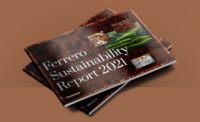Barry Callebaut Group presented today a set of sharpened targets for Forever Chocolate, its plan to make sustainable chocolate the norm, and added additional targets extending its impact beyond 2025. Launched in 2016, the Forever Chocolate targets for 2025 are unique in the cocoa and chocolate industry in terms of their ambition. Barry Callebaut will use its sharpened targets as a springboard to extend the horizon beyond 2025. With new measurable targets for 2030 and beyond, the Group is committed to driving long-term systemic change for a sustainable cocoa supply chain, with the support of its customers and to the benefit of all stakeholders.
For Forever Chocolate to become a reality, public intervention is required to drive structural change beyond Barry Callebaut’s direct supply chain. An enabling policy environment and government action in origin countries is essential to address the issue of traceability, rural infrastructure development and proper enforcement of national policies and legislation.
The Forever Chocolate plan is focusing on four pillars, addressing the material challenges in the cocoa and chocolate supply chain:
- Prospering farmers – from “training” to “support doing." Barry Callebaut remains on track to have lifted more than 500,000 cocoa farmers out of poverty by 2025. To this existing commitment, the Group is adding that by 2030 it will have mobilized public and private stakeholders to collectively support and implement a transformative cocoa farming model generating living income. The main struggle of cocoa farmers is access to investments in their farms. This is why Barry Callebaut shifts its focus going forward from training, to providing input support. This ranges from subsidized soil inputs, planting material, to financial support for third-party labor services and additional premiums. Improving their quality yield per hectare remains key to lift smallholder cocoa farmers out of poverty and put them on a trajectory towards a living income.
- Human rights – adding empowerment to remediation. Barry Callebaut is sharpening its commitment to eradicate child labor from its supply chain. By 2025, the entire supply chain will be covered by Human Rights Due Diligence, remediating all child labor cases identified. By 2030, all farming communities Barry Callebaut sources from will be empowered to protect human rights. This will require both private and public intervention to build the enabling infrastructure, foremost the establishment of Child Protection Committees at cocoa farmer community level and ensuring access to quality education.
- Thriving nature – Aligning with global efforts to cap global warming. To ensure better alignment with the emission reduction trajectory of the Paris Climate Agreement, Barry Callebaut will focus increasingly on insetting CO2 through agroforestry, moving away from offsetting. This implies that by 2030, Barry Callebaut will have decarbonized its footprint in line with global efforts to cap global warming at 1,5 degrees. Following this ambitious trajectory, Barry Callebaut will be a net zero company by 2050. In addition to its decarbonization efforts, the Group maintains its target to be forest positive by 2025.
- Sustainable Ingredients – reinforced commitment to transparency. By 2030, Barry Callebaut will have 100% certified or verified cocoa and ingredients in all of its products, traceable to farm level. Establishing industry-wide sustainability standards and programs is essential for the sustainable sourcing of raw materials, as certification is only the starting point. This is why the Group has been working in the past six years both with suppliers and industry programs to define and implement sustainability standards for all of the ingredients Barry Callebaut sources, including for dairy, palm oil, coconut, and nuts.
"Our Forever Chocolate targets are dynamic by design. The requirements of a sustainable cocoa and chocolate supply chain are constantly evolving and transforming. Plus, since the start of Forever Chocolate, we continuously generated new insights through data analysis and engagement with experts. We therefore wanted to add fresh ambition to our Forever Chocolate plan with more focus on impact on the ground beyond compliance, on supporting and empowering beyond training, and on a systemic approach beyond individual intervention. This is why we have sharpened our existing Forever Chocolate targets and added additional targets extending our impact beyond 2025," says Steven Retzlaff, president, global cocoa.
"It is clear that we cannot reach these targets on our own. For Forever Chocolate to become a reality, we need public intervention to drive structural change beyond our direct supply chain," says Retzlaff.
Tangible impact on the ground in the past six years
Since the launch of Forever Chocolate in 2016, Barry Callebaut’s plan to make sustainable chocolate the norm has generated tangible impact on the ground. Its efforts have been externally recognized by leading ESG ratings. Key achievements to date include:
- Prospering farmers: Almost 215,000 cocoa farmers were lifted out of poverty.
- Zero child labor: 81% of farmer groups Barry Callebaut directly sources from have systems in place to prevent, monitor and remediate child labor.
- Thriving nature: A reduction of overall carbon intensity per tonne of product by more than 18% since 2016 and traceability established for almost 80% of farms in Barry Callebaut’s direct supply chain.
- Sustainable ngredients: one out of two of all the products sold contain 100% sustainable chocolate or cocoa.
Cocoa Horizons remains preferred vehicle for implementation
Going forward, the collaboration with the Cocoa Horizons foundation will remain Barry Callebaut’s preferred vehicle for the implementation of its sustainability activities in its cocoa supply chain. Driven by strong demand from customers, since 2016 over CHF 122 million in funds could be generated. These funds are invested into activities that help farmers improve their productivity and income, fight against child labor and deforestation, and become net zero.




.png?height=200&t=1670345955&width=200)